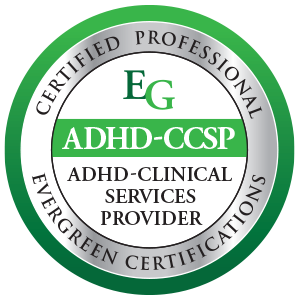Do you often find yourself attempting a task and being assailed by worry that you should be doing something else?
I’ve written before about the slippery relationship that people with ADHD have with time. It impacts all sorts of experiences in life, including this one, which many of my clients describe.
This experience can make it really hard to focus on what you’re doing, and can lead to a constant anxiety (“Am I doing the right thing?”), and sometimes a sense of guilt (“I should be doing that other thing.”) Talking with a client about this recently, he connected it with the experience of having what he called “stand-alone days,” days that feel disconnected from one another, out of the context of the flow of time, especially disconnected from the days that are to come. It’s an aspect of the ADHD experience of feeling the present too much, and not appreciating the future enough. This over emphasis of “now” can result in experiencing your days in isolation. Today feels like the only day, and so “the last day to do anything.” There’s a maddening sense of urgency and overwhelm, which produces stress and sometimes despair. You know all these things need doing, and it feels like they all have to happen now. How can you know what to do first, and if you do start on something how can you know it’s the right thing to do when all those other things have to happen too? Often the only guide seems to be what I “feel like doing” in the moment (and will then start second guessing, or possibly get lost in), or what has the most painfully urgent deadline attached to it. Despite your best efforts this is a stressful process, and the practical results tend not to be great. At the end of the day, I haven’t got much done, especially relative to the “everything” that needed doing. The options seem to be either to suffer through this stress and anxiety for little felt reward (even perhaps the “punishment” of feeling incompetent or guilty); or to give up, do nothing, and procrastinate, putting things off for some other stand-alone day in the undefined future.
Does this sound familiar to you? If so, you’re not alone.
working with your brain, not against it
If you understand how this experience evolves from an underlying difficulty with the experience of time, you can find ways to work with it. As Jessica McCabe* puts it, it’s about learning to work with your brain rather than against it. This does in the first place require a certain acceptance that this is the way your brain works, by default at least. If I keep thinking my brain should work some other way (“like other people”), I’m fighting against it, not working with it. A degree of acceptance is needed before much change can take place. Luckily, for a lot of people the right medication can help with the brain’s processing of time, and make these issues easier to deal with. But even then, some kind of external supplemental help in “seeing the future more” is going to be needed. Indeed, anyone with a busy life, ADHD or not, is going to need external help to keep track. Calendars, probably big ones that go on the wall, are your friend.
Seeing the future more
Calendars are a great visual representation of the fact that tomorrow and next week and next month actually exist. We can use them as a way to “see” the future, and feel the future, in a more concrete way. To-do-lists without calendars are often unhelpful because they are so overwhelming (all the many things that could / should happen on this one stand-alone day!) But laying items out on a calendar and seeing that this can happen on Tuesday and that can happen on Wednesday, can restore a sense of control and reduce the feelings of panic or despair. Over time, you can relax into the knowledge that what you’re doing now is the right thing to be doing and that other things too will have their time. In the end, more gets done, and there’s less anxiety, and less guilt.
Therapy can help with this process of acceptance and change. If you’d like support in working through your challenges with ADHD, let’s talk.
___
For more on the role of time in ADHD, and more about strategies that can help, have a look at this article on my blog, and check out anything by Ari Tuckman, including his book The ADHD Productivity Manual and this YouTube video, ADHD Is All About Seeing Time & Feeling the Future.
* Jessica McCabe’s book is called How To ADHD: Working With Your Brain (Not Against It).



